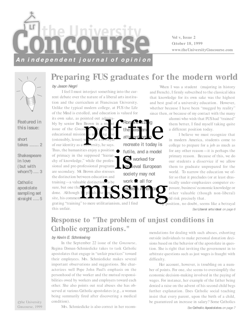Strangers to the world
by Kathleen van Schaijik
A line from one of Fr. Michael’s homilies has stayed with me over the years. “As Catholics we don’t live in the world and go to church,” he said. “We live in the Church and go out into the world.” This was a completely new thought to me, and I thrilled to its rhetoric. I recognized it as a truth, and wished it were true of me too. But I had enough self-knowledge to realize that it wasn’t. I admired it the way I admired the stories of saints who could spend hours a day in adoration of the Blessed Sacrament, or of the martyrs who had suffered and died for their Faith in concentration camps. “Wouldn’t it be great to have that degree of holiness? To have God be so real to you that everything else in your life is insignificant?” It was a dream.
Last September my husband and I traveled with his family to the Riviera for a mini-vacation. We arrived in Nice late in the evening, and took a stroll through the old center before retiring to our hotel. The glamorous Mediterranean streets were still lively at midnight—lit up, filled with music and crowded sidewalk cafes. The atmosphere was relaxed and festive, but I was oppressed by a sense of un-belonging. It wasn’t my kind of music; the people there were strangers to me; I couldn’t speak their language; I didn’t know the rules—the right way to behave, what to wear, who was important…I was an outsider, a spectator only, and it depressed me a little. I felt like a misfit.
In the morning we took the same streets, now deserted, to Mass in the old Cathedral. Stepping through the enormous doors into the candlelit interior, I experienced—intensely and unexpectedly—a sense of returning home after a long journey in a foreign country. The language was no barrier here at all. I knew exactly what was going on; I could follow the readings, and worship God through the hymns. I felt a warm sense of kinship with the people worshipping with me. I had had enough high school French and enough FUS theology to know that the homily was doctrinally sound, and inspiring. I knew when to sit, when to stand, to kneel. I rejoiced in the thought that fellow Catholics all over the world were intimately joined with me—one bread, one body, one sacrifice of praise. The Church was a universe in itself. The world outside was unreal, passing; this was true, everlasting, and I belonged to it. I noticed several people near me who looked as if they felt as awkward and out-of-place in the church as I had felt on the streets the night before. I pitied them, and wished I could draw them in. And I remembered Fr. Michael’s homily.
I had a similar experience in March when we went to visit an order of Poor Clares in Eindhoven. They were Americans who had come to Holland when their Motherhouse in New Mexico got too crowded. They served us coffee through a little sliding door in the wall, and talked to us from behind a screen. Their feet were bare. We asked whether they had had any particular hopes or plans in coming to Holland. They said, “To pray and to die here.” (They were radiant with peace as they said it.) On one level, it was a strange experience—so unlike anything we encountered in the world outside. But on another, more important one, it was wonderfully familiar. A veil had parted again, revealing a different world—one present in the ordinary world, but transcending it, sustaining it by prayer and sacrifice, hidden, and utterly incomprehensible to it. I recognized it, with deep joy and gratitude, as my true home.
This is what the Holy Spirit does to a person. We do nothing but believe in God, and participate in the sacramental life of the Church, and we discover one day that a change has been taking place in our souls. Unless we prevent it, grace reforms us completely—gradually giving us new desires, new ways of thinking, new tastes, new companions, new hopes and aims. Time goes by and we find that we no longer belong to the world. Our souls are mysteriously rooted in the supernatural life of the Church, where they live and move and have their being.
Kathleen van Schaijik


